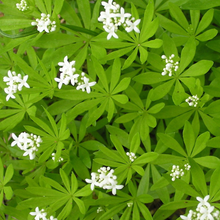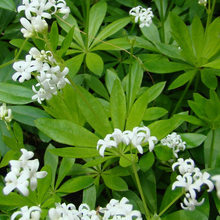Galium odorata, commonly known as Sweet Woodruff, is a fragrant low growing perennial perfect for shady garden areas. Its bright green, whorled leaves form dense mats, and delicate white star shaped flowers appear in late spring, releasing a sweet vanilla like scent that attracts pollinators and adds charm to borders, woodland gardens, and shaded groundcover areas.
Height & Spread: 6 - 8 in x 12 - 24 in
Bloom Time: Late spring
Light Requirements: Partial to full shade
Soil Preference: Moist, well drained, humus rich soil
Watering Needs: Moderate; prefers evenly moist soil
Deer Resistance: Generally avoided by deer due to aromatic foliage
Native Status
Galium odorata is native to Europe and parts of Western Asia. It has been widely cultivated for its ornamental and fragrant qualities and adapts well to shaded garden environments.
WILDLIFE & INSECTS
Bees
- Attracts native bumblebees and honeybees seeking nectar from its small white flowers, supporting pollination in shady areas.
Hoverflies
- Hoverflies are drawn to the blooms and act as beneficial predators by controlling aphid populations nearby.
Butterflies
- Small butterflies, including Whites and Skippers, visit for nectar, adding seasonal movement and visual appeal.
Spacing & Landscape Use
Spacing Recommendations:
- Space 12 - 18 in apart to allow full mat formation and healthy air circulation.
Landscape Placement:
- Ideal for shaded borders, woodland gardens, groundcover under shrubs, and pathways where aromatic foliage is desired.
Companion Plants
- Brunnera macrophylla (Jack Frost) - Silvery veined leaves provide brightness and pairing with green Sweet Woodruff foliage.
- Heuchera 'Palace Purple' - Deep purple foliage complements the bright green mats and adds seasonal color contrast.
- Hosta (Plantain Lily) - Large textured leaves provide contrast and layered height above low Sweet Woodruff mats.
- Astilbe (Fanal) - Feathery flower plumes add vertical interest and a delicate contrast to low growing groundcover.
- Ferns (Dryopteris erythrosora) - Bronze tinged fronds create textural interest in shaded areas.



